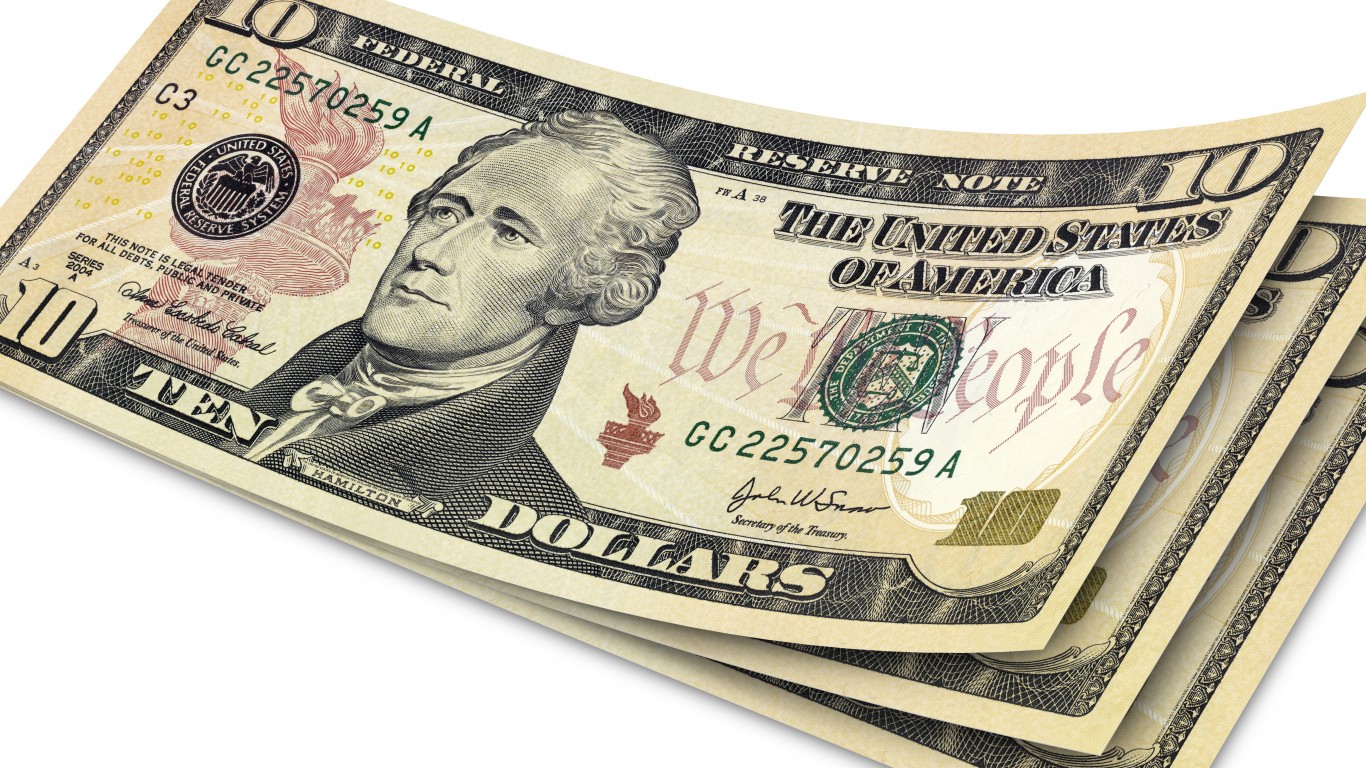
The three major U.S. equity indexes closed lower on Monday. The Dow Jones industrials ended the day down 0.39%, the S&P 500 closed 0.75% lower and the Nasdaq retreated 1.03%. Ten of 11 sectors closed lower, led by communication services (−1.67%) and tech (−1.34%). Energy (0.6%) posted the only gain.
This week’s economic highlight is the Federal Open Market Committee (FOMC) meeting, which begins Tuesday and concludes with a press announcement on Wednesday. The FOMC is expected to tack on another 0.75% interest rate hike, raising the federal funds rate from a range of 3.00% to 3.25% to a new range of 3.75% to 4.00%. On Friday, the monthly report on nonfarm payrolls is expected to show a gain of 220,000 jobs, down from the September total of 263,000 new jobs. The headline unemployment rate is forecast to tick higher, from 3.5% to 3.6%.
All three major indexes traded higher in Tuesday’s premarket session.
After U.S. markets closed Monday, NXP Semiconductors reported lower-than-expected earnings per share (EPS) but beat the consensus revenue estimate. The Dutch chipmaker also issued downside revenue guidance for the current quarter. Shares traded essentially flat in Tuesday’s premarket.
Before markets opened Tuesday morning, BP hammered EPS estimates but missed the revenue estimate by about $6 billion (10%). Lower refining margins and lower prices for liquids got the blame. Shares traded up about 0.3% in the premarket.
Enterprise Products beat estimates on both the top and bottom lines. Shares traded up about 0.4% early Tuesday.
Marathon Petroleum also beat top-line and bottom-line estimates. The company has completed a $15 billion buyback program and raised its dividend by 30% to $3.00 annually. Shares traded up more than 1%.
Newmont missed consensus estimates on both the top and bottom lines. The gold miner reaffirmed its fiscal year production estimate of 5.9 million ounces of gold. Shares traded up about 1.5%.
Sofi Technologies missed the consensus EPS estimate but beat on revenue. The decentralized finance company also issued upside revenue guidance for the fiscal year. Shares traded up more than 16% in Tuesday’s premarket.
Uber also missed on profit but beat on revenue. The ride-sharing giant issued strong guidance on gross bookings and adjusted EBITDA. Shares traded up about 10%.
After markets close Tuesday, Airbnb, AMD, Devon Energy and Energy Transfer will report quarterly results. Wednesday morning, Cenovus Energy, CVS Health, Norwegian Cruise Lines and Paramount Global are on deck to report quarterly results.
Here is a preview of four companies set to report quarterly results after U.S. markets close Wednesday.
Albemarle
Lithium producer Albemarle Corp. (NYSE: ALB) has added nearly 12% to its share price in the past 12 months. The company posted a new 52-week high in mid-September, and shares have dropped nearly 9% since then.
Albemarle increased its dividend payment last week and closed the $200 million acquisition of a China-based lithium refiner. Prices for battery-grade lithium carbonate have reached an all-time high of around $77,000 per metric ton, a near-doubling of the price since the beginning of the year. Albemarle also received $150 million from the federal Inflation Reduction Act to help pay for a new lithium concentrator in North Carolina.
Analysts are bullish on Albemarle. Of 22 brokerages covering the stock, 13 have a Buy or Strong Buy rating and seven rate the shares at Hold. At a recent price of around $250.00 a share, the implied gain based on a median price target of $314.00 is 12.1%. Based on the high price target of $440.00, the upside potential is 57.1%.
Third-quarter revenue is forecast at $2.21 billion, which would be up nearly 50% sequentially and 166% higher year over year. Adjusted EPS are forecast at $6.99, up over 102% sequentially and by 566% year over year. For the full 2022 fiscal year, analysts expect Albemarle to report EPS of $21.31, up 427%, on sales of $7.51 billion, up more than 125%.
Albemarle stock trades at about 13.1 times expected 2022 EPS, 10.7 times estimated 2023 earnings of $26.08 and 11.4 times estimated 2024 earnings of $24.57 per share. The stock’s 52-week trading range is $169.93 to $308.24. Albemarle pays an annual dividend of $1.58 (yield of 0.56%). Total shareholder return over the past year was 12.5%.
APA
Independent oil and gas producer APA Corp. (NYSE: APA) has added about 74% to its share price over the past 12 months. Since posting a 52-week high in early June, however, the stock dropped 38% after four weeks, before bouncing higher to narrow the loss since June to about 8.3%.
Crude oil prices have dropped by about 28% since early June, primarily due to recession fears and the continuing Russian war on Ukraine. In an early October press release, APA estimated its average realized price per U.S. barrel of oil would be $94 in the third quarter and that U.S. production would exceed 212,000 barrels of oil equivalent. International prices are expected to average $100 per barrel of oil and production is forecast at around 171,000 barrels of oil equivalent
Analysts remain bullish on the stock, with 17 of 28 having a rating of Buy or Strong Buy and 10 more rating the shares at Hold. At a share price of around $45.50, the upside potential based on a median price target of $52.00 is about 14.3%. At the high price target of $75.00, the upside potential is about 64.8%.
For the company’s third quarter of fiscal 2022, analysts expect APA to report revenue of $2.35 billion, down 22.9% sequentially but up 42.4% year over year. Adjusted EPS are expected to come in at $1.78, down 24.8% sequentially and 81.6% higher year over year. For the full fiscal year, EPS are forecast at $8.30, up nearly 113%, on sales of $10.66 billion, up 34.5%.
APA stock trades at about 5.5 times expected 2022 EPS, 4.8 times estimated 2023 earnings of $9.49 and 5.2 times estimated 2024 earnings of $8.79 per share. APA’s 52-week range is $22.94 to $51.95. The company pays an annual dividend of $1.00 (yield of 2.2%). Total shareholder return for the past year was 76.3%.
Qualcomm
Networking chip and equipment maker Qualcomm Inc. (NASDAQ: QCOM) has lost more than 11% from its share price over the past 12 months. For the year to date, the share price is down by nearly 35%.
The company is currently embroiled in a dispute with chip designer Arm, which has threatened to force Qualcomm’s OEM customers into becoming Arm licensees, cutting Qualcomm out of its role as a supplier of licensed Arm designs to its customers. Arm has claimed that Qualcomm’s recent acquisition of Nuvia violates an already-terminated license agreement between Arm and Nuvia.
Of 33 analysts covering the company, 21 have Buy or Strong Buy ratings, and the other 12 rate the stock a Hold. At a share price of around $117.70, the upside potential based on a median price target of $172.50 is 46.6%. At the high target of $250.00, the upside potential is 112.4%.
Fourth-quarter fiscal 2022 revenue is forecast to come in at $11.37 billion, up 4.1% sequentially and by 22.0% year over year. Adjusted EPS are forecast at $3.13, up 5.9% sequentially and by 22.7% year over year. For the full fiscal year, analysts currently expect the company to post EPS of $12.51, up 46.5%, on sales of $44.12 billion, up 31.8%.
Qualcomm stock trades at about 9.4 times expected 2022 EPS, 9.2 times estimated 2023 earnings, 11.6 times estimated 2023 earnings of $12.77 and 8.8 times estimated 2024 earnings of $13.30 per share. The stock’s 52-week range is $104.66 to $193.58. Qualcomm pays an annual dividend of $3.00 (yield of 2.52%). Total shareholder return over the past 12 months was negative 9.9%.
Robinhood
Within a week of its initial public offering in late July last year, shares of Robinhood Markets Inc. (NASDAQ: HOOD) doubled in price. As of Monday’s close, the stock traded down more than 83% below that high and 66.5% below its IPO price. Among buyers of the stock are Cathie Wood’s ARKF and ARKW ETFs. ARKF has added about $8 million worth of Robinhood shares to its portfolio and is the fund’s sixth-largest position with $55 million invested. ARKW’s position is valued at around $45 million and is the fund’s 13th-largest position.
Just 14 brokerages cover the stock. Of those, just four have a Buy or Strong Buy rating and six more rate the share at Hold. At a recent price of around $11.70, the shares have outrun their median price target of $10.65. At the high price target of $13.00, the upside potential is 11.1%.
For the third quarter of 2022, revenue is forecast at $367.8 million, up 15.7% sequentially and less than 1% higher year over year. Analysts are looking for an adjusted loss per share of $0.25, compared to a loss of $0.31 per share in the previous quarter and the year-ago loss of $0.07. For the full fiscal year, current consensus estimates call for an adjusted loss per share of $1.13, far below the 2021 fiscal year loss of $7.49 per share. Revenue is forecast at $1.38 billion, down 24.1%.
Robinhood is not expected to post a profit until 2024. Shares trade at a multiple of 28.9 times estimated 2024 EPS of $0.40. The stock’s 52-week range is $6.81 to $38.17. The company does not pay a dividend. The total shareholder return for the past year was negative 66.6%.
Take Charge of Your Retirement In Just A Few Minutes (Sponsor)
Retirement planning doesn’t have to feel overwhelming. The key is finding expert guidance—and SmartAsset’s simple quiz makes it easier than ever for you to connect with a vetted financial advisor.
Here’s how it works:
- Answer a Few Simple Questions. Tell us a bit about your goals and preferences—it only takes a few minutes!
- Get Matched with Vetted Advisors Our smart tool matches you with up to three pre-screened, vetted advisors who serve your area and are held to a fiduciary standard to act in your best interests. Click here to begin
- Choose Your Fit Review their profiles, schedule an introductory call (or meet in person), and select the advisor who feel is right for you.
Why wait? Start building the retirement you’ve always dreamed of. Click here to get started today!
Thank you for reading! Have some feedback for us?
Contact the 24/7 Wall St. editorial team.

 24/7 Wall St.
24/7 Wall St.



